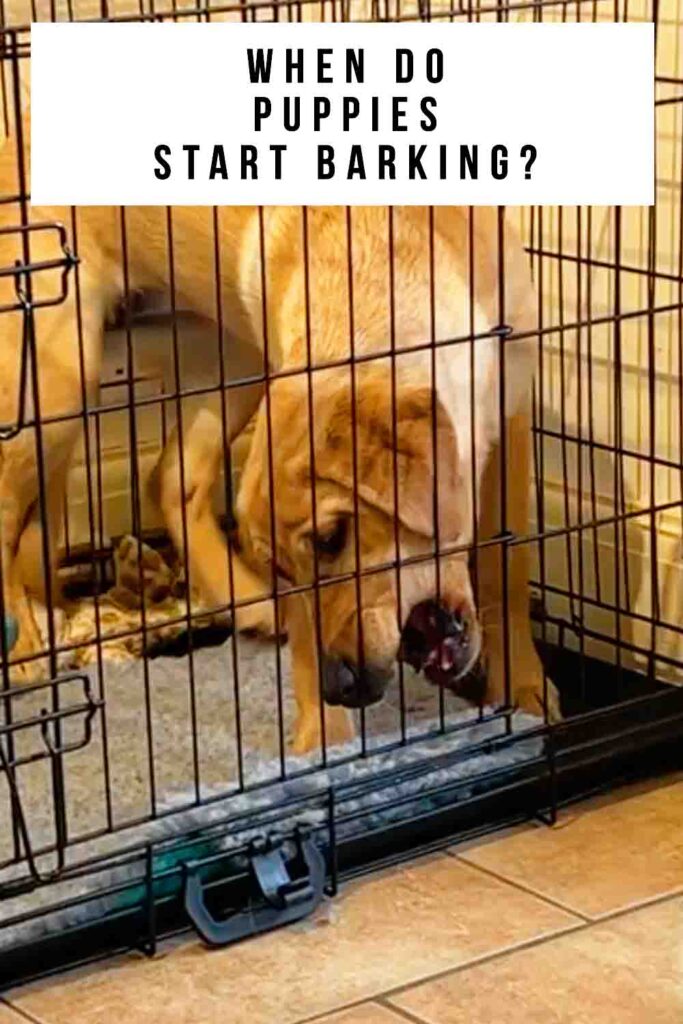When Do Puppies Start Barking?
Our litters of puppies all started barking at around three weeks old. Although newborn puppies are physically capable of barking from the day that they are born, it’s very unusual to hear. Most puppies start barking or to make low murmurs or grunts at around two weeks, once their eyes and ears are opened. But you will find some puppies won’t vocalize at all until they are closer to eight weeks old, and some that will never utter a sound. Not because they can’t, but because they’ve never learned to use their voice to their advantage.
Contents
- Puppy barking development.
- When do puppies start barking?
- Playful puppy sounds.
- Watchdog behaviors.
- When do puppies start barking for attention?
A lack of barking in your new puppy is rarely a cause for concern. Quite the opposite, in fact. Our young Lab puppy Bonnie only uses her voice about once a week when really excited about something.
Most settled dogs that have their needs met have no need to bark. And if they are happily socialized they won’t feel the need to make warning alerts even when visitors arrive.
Your Puppy’s Physical Ability To Bark
Puppies are born with the physical ability to make vocal sounds. Their tiny throats have all the right equipment, but it’s not had a lot of practice yet. The noises newborn puppies make will be muffled, and at first they normally won’t make a lot of sound at all.
Muffled squeaks, grunts and whimpers can appear from the first day, but are more likely to be expressed from two weeks. Once their ears and eyes are open, and they are beginning to explore their surroundings, naturally noises begin.
When Do Puppies Start Barking?
Although they are able to make sounds from very early on, most puppies won’t properly bark until they are a few weeks old. But even then, you’ll notice that several members of the litter might not make any vocal sounds at all.
All puppies are capable of barking, but when they start to call to one another will vary and be inspired by different feelings and behaviors.
When Do Puppies Start Barking During Play?
Some of your puppy’s earliest noises will come as a result of play. By a few weeks old puppies engage in games with their littermates. Tugging at each other’s ears, chasing each other and this is often accompanied by yips of excitement or experiments with growling. It can even appear to be quite fierce, when in fact it’s all innocent fun.

Sounding The Alarm
Most well socialized puppies with friendly parents will be confident in their homes, but some can be anxious. Especially if they are kept away from their human family or have a distinct lack of visitors to their part of the house. Fearful puppies might bark to sound the alert to their mom, or in an attempt to ward off something they see as a threat.
This bark can be aimed at humans, but puppies also start barking at inanimate objects that are unfamiliar to them too.
When Do Puppies Start Barking For Attention?
It’s really easy to accidentally teach an animal to make a noise for attention. My cat is the most spectacular example of this. As a kitten I responded to every adorable meow with pets, games or food. He now at fourteen years old has no hesitation in demanding my attention at every possible moment. Fortunately, I did not make the same mistake with our dogs. Although I might question my own intelligence on occasions that I didn’t transfer my canine knowledge on that point to my feline experiences…
Many puppies upon making a bark or whine will have their new attentive owner’s attention immediately. We all wonder what the sound means, and if their needs aren’t being met. We then try to help them by offering affection, experiences or even food. The noise might have not meant they needed anything at all, but it resulted in a positive thing. And therefore the likelihood of them trying out these noises again increases. And it does so rapidly and more enthusiastically over time.
Pretty soon you’ve got a dog that loves a chat, and some neighbors with rather grumpy expressions on their faces.
Fortunately, it’s possible to teach even the most enthusiastic barker to stop making so much noise. But the best method is to not outwardly react when your puppy starts to bark. So they never learn that it’s a good way to get your attention!
Enjoying The Sound Of Their Own Voice
Some puppies start barking and continue however without your input. And that’s because they simply love the sound of their own voice. (Much like some humans that I’m sure we can all think of!). In my experience once puppies start barking in earnest, they rarely stop for long without a good incentive to keep quiet. Like reward based click for quiet training!

Free Labrador Updates!
Get my training tips, news, reviews, and the latest from The Labrador Site delivered to your inbox

